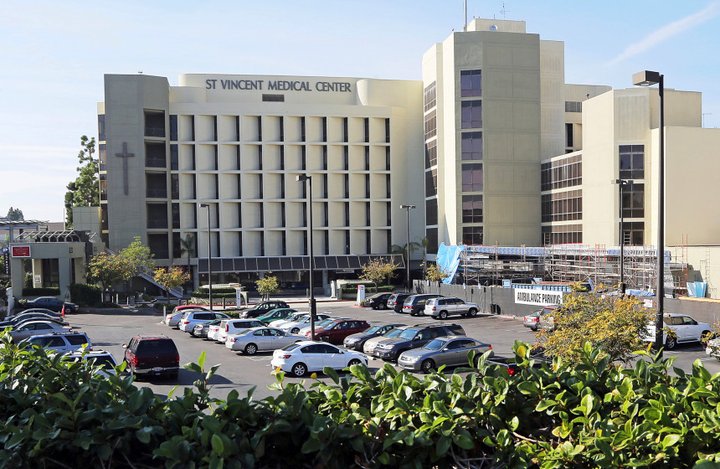
This Oct. 11, 2014 file photo shows St. Vincent Medical Center near downtown Los Angeles. A bankruptcy court has been asked to give permission for the closure of the Los Angeles hospital following the collapse of a sale. Verity Health System announced its plan to close St. Vincent Medical Center on Monday, Jan. 6, 2020, the Los Angeles Times reported. Photo by Reed Saxon, AP File Photo.
###
As California braced for an onslaught of desperately ill coronavirus patients, Gov. Gavin Newsom announced plans over the weekend to open two new hospitals, and President Donald Trump said the federal government will ship a number of mobile hospital units to the state, pay for National Guard deployments and deploy the San Diego-based naval hospital ship Mercy to Los Angeles.
The announcements, made in anticipation of a tidal wave of coronavirus hospitalizations, came as Trump ramped up aid to California, New York and Washington, the three states in the U.S. hardest hit by the outbreak.
At Newsom’s request, Trump on Sunday declared a “major disaster” in California, a followup to the president’s declaration of a national emergency last week, which allowed him to grant up to $50 billion in federal aid to state and local governments. The formal declaration will let California — which as of this weekend had 1,468 positive cases and 27 deaths from the coronavirus — offer more emergency aid, unemployment assistance and disaster legal services. Similar declarations were issued for New York and Washington.
California is leasing Seton Medical Center in Daly City and St. Vincent Medical Center in Los Angeles for three months, at a total cost of $30 million, Newsom said Saturday. St. Vincent hospital, which had been closed, and Seton, which was on the brink of closure, are being prepped to care for nearly 500 COVID-19 patients combined.
The state is trying to arrange for 10,000 new hospital beds to cover anticipated shortfalls, Newsom said. It’s also working to lease 51,000 motel rooms that could be used to shelter homeless or as make-shift hospital rooms.
“We have made it clear that we are prioritizing the most vulnerable Californians, and we have made clear that our most vulnerable Californians include the homeless,” Newsom said Saturday.
He added that hotel rooms the state is acquiring may also be used as hospital rooms if hospitals fill up, and said the U.S. Army Corps of Engineers had already begun working on converting some hotels into “quasi-hospitals” by upgrading their electrical and ventilation systems.
Newsom said the state had begun receiving additional medical supplies — such as masks, gloves and surgical gowns — from requests made to the federal government. And he lauded California-based companies for offering new ways to get the state’s health care system ready for a potential surge of COVID-19 patients.
The governor said Bloom Energy in San Jose is rehabilitating old ventilators that will soon be tested to see if they can be certified for use. And he said he was in conversations with Elon Musk, founder of Tesla and Space-X, about developing medical equipment using 3D printing technology.
The followup request to the president on Sunday underscored the urgency of California’s situation.
“(D)espite the Herculean efforts to rapidly expand the capacity of California’s healthcare delivery system, there will without a doubt be extraordinary additional needs,” Newsom wrote. “It is clear additional resources are immediately necessary to adequately respond to the unmet needs of the people and businesses of California.”
Californians are adjusting to state and local orders to stay home, except for essential trips, in order to stem the spread of coronavirus. The orders allow people to go outside for exercise or fresh air, but people are expected to keep at least 6 feet of distance from others. Yet on a sunny Saturday, pictures surfaced on social media showing bumper-to-bumper traffic heading to the beach and crowds strolling along San Francisco Bay.
Asked on Saturday whether he planned to issue a new order restricting access to state beaches or parks, Newsom said “I hope not,” and called on Californians to use common sense.
“I want people to feel free and walk their dog, I just don’t want them to walk their dog where there are hundreds of others concentrated,” he said.
“I want people to feel free to take a deep breath. Fresh air. Get some exercise. Take a nice walk. Hike out in nature. Walk along the beach — just not with thousands of others.”
###
CalMatters reporter Ben Christopher contributed to this report. CALmatters.org is a nonprofit, nonpartisan media venture explaining California policies and politics.
CLICK TO MANAGE